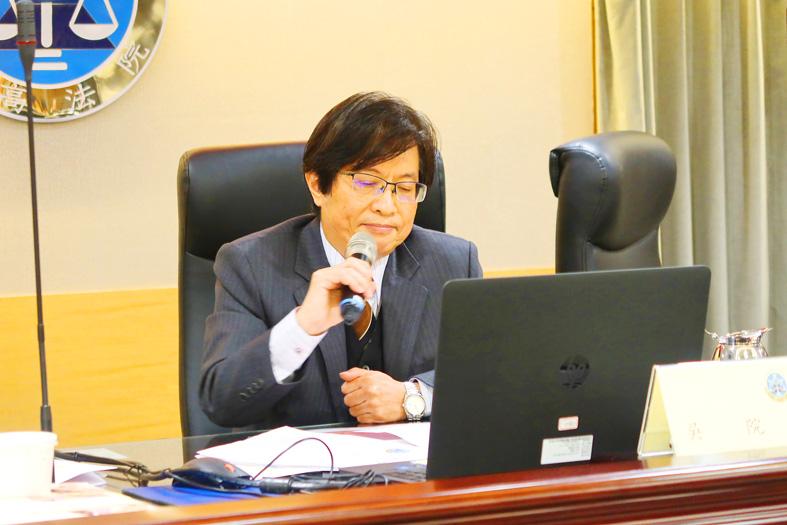Supreme Court Chief Justice Wu Tsan (吳燦) yesterday became the first senior judicial official to issue a public apology over a scandal that allegedly involves nearly 40 judicial workers and prosecutors who allegedly had inappropriate ties with Chia Her Industrial Co president Weng Mao-chung (翁茂鍾).
During an interview, Wu said: “I wish to apologize, on behalf of the Supreme Court, to other members of the judiciary and the public, because we have not done our task well.”
In 2012, Weng was sentenced to eight years in prison for breaching the Securities and Exchange Act (證券交易法). The sentence was later reduced to four months.

Photo: CNA
Last year, the Control Yuan passed a motion to impeach former Commission on the Disciplinary Sanctions of Functionaries secretary-general Shih Mu-chin (石木欽), a friend of Weng, for allegedly breaching the Judges Act (法官法).
Shih, who until 2017 served a Supreme Court judge, did not to recuse himself from cases involving Weng and allegedly provided Weng with legal advice, investigators of the Judicial Yuan and the Ministry of Justice said.
Investigators in January said they had found that up to 40 judicial works have had “inappropriate dealings” with Weng.
Of the 20 judges involved, Lin Chi-fu (林奇福), Yen Nan-chuan (顏南全) and Wu Hsiung-ming (吳雄銘) have admitted that they have handled cases involving Weng.
Wu Tsan cited former Judicial Yuan vice president Su Yung-chin (蘇永欽) as saying that “even if one is dissatisfied with the Supreme Court, they should still retain basic respect for the court of final appeal.”
However, the Weng scandal has undermined public trust in the judiciary, Wu Tsan said.
Media reports on the case have irrevocably tarnished the court’s reputation, and in extension that of the entire judiciary, he said.
Members of the judiciary would not have to cut all personal ties, but they must be careful to keep them separated from their professional dealings, Wu Tsan said.
However, he hopes that the issue would soon subside and the court return to its daily business as court of final appeal, Wu Tsan said.
The Supreme Court has to work to gain respect by the public and the lower courts, he said.

Alain Robert, known as the "French Spider-Man," praised Alex Honnold as exceptionally well-prepared after the US climber completed a free solo ascent of Taipei 101 yesterday. Robert said Honnold's ascent of the 508m-tall skyscraper in just more than one-and-a-half hours without using safety ropes or equipment was a remarkable achievement. "This is my life," he said in an interview conducted in French, adding that he liked the feeling of being "on the edge of danger." The 63-year-old Frenchman climbed Taipei 101 using ropes in December 2004, taking about four hours to reach the top. On a one-to-10 scale of difficulty, Robert said Taipei 101

Nipah virus infection is to be officially listed as a category 5 notifiable infectious disease in Taiwan in March, while clinical treatment guidelines are being formulated, the Centers for Disease Control (CDC) said yesterday. With Nipah infections being reported in other countries and considering its relatively high fatality rate, the centers on Jan. 16 announced that it would be listed as a notifiable infectious disease to bolster the nation’s systematic early warning system and increase public awareness, the CDC said. Bangladesh reported four fatal cases last year in separate districts, with three linked to raw date palm sap consumption, CDC Epidemic Intelligence

Two Taiwanese prosecutors were questioned by Chinese security personnel at their hotel during a trip to China’s Henan Province this month, the Mainland Affairs Council (MAC) said yesterday. The officers had personal information on the prosecutors, including “when they were assigned to their posts, their work locations and job titles,” MAC Deputy Minister and spokesman Liang Wen-chieh (梁文傑) said. On top of asking about their agencies and positions, the officers also questioned the prosecutors about the Cross-Strait Joint Crime-Fighting and Judicial Mutual Assistance Agreement, a pact that serves as the framework for Taiwan-China cooperation on combating crime and providing judicial assistance, Liang

US climber Alex Honnold left Taiwan this morning a day after completing a free-solo ascent of Taipei 101, a feat that drew cheers from onlookers and gained widespread international attention. Honnold yesterday scaled the 101-story skyscraper without a rope or safety harness. The climb — the highest urban free-solo ascent ever attempted — took just more than 90 minutes and was streamed live on Netflix. It was covered by major international news outlets including CNN, the New York Times, the Guardian and the Wall Street Journal. As Honnold prepared to leave Taiwan today, he attracted a crowd when he and his wife, Sanni,